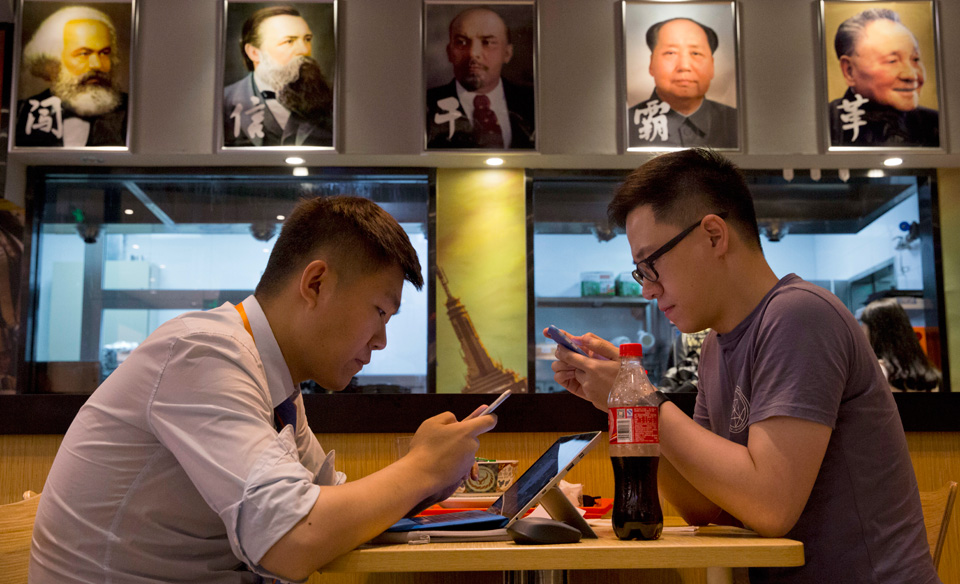
Nearly 30 years ago, the “death of communism” was announced following the collapse of the Soviet Union and the fall of the Berlin Wall.
In the much-quoted words of the right-wing commentator Francis Fukuyama, it was “the end of history,” marked “the end point of mankind’s ideological evolution and the universalization of Western liberal democracy as the final form of human government.”
Now it appears that, maybe after all, just like the great anti-imperialist writer Mark Twain, reports of communism’s demise have been greatly exaggerated.
Last month’s 19th congress of the Communist Party of China provoked a wave of reluctant second opinions, with the corpse declared to be in dangerously rude health.
A Washington Post columnist expressed the anxiety of the Beltway liberals by talking of “Xi Jinping’s quest to revive Stalin’s communist ideology.” The bipartisan journal Foreign Affairs warned ominously of the “The Bolsheviks in Beijing—What the Chinese Communists Learned from Lenin.” Socially concerned Guardian readers were told that “Xi Jinping’s Leninist quest for a dynasty inspires congressional love-in,” and BBC blogs talked of China’s “unreformed Leninist political system.”
It is an especially anxious time for North Atlanticist liberals and social democrats in Britain. The two once sturdy pillars supporting their beliefs, a U.S.-led NATO and a market-led European Union, have never looked shakier.
The Guardian’s Martin Kettle, the offspring of British communist intellectuals and who briefly held a CP card himself, offered a comment piece that was typical in its bleak perspective.
Headlined “We are obsessed with Brexit and Trump: We should be thinking about China,” Kettle sketched out his modern version of the Zhdanov Doctrine—a world divided neatly into two camps.
“The competition between the liberal democracies and the socialist authoritarians is not yet a new cold war. But the rivalry will redefine the next 30 years, whether any of us likes it or not.” And Kettle does not like it. Not one bit.
Liberal democracy is essentially a polite euphemism for capitalism and Chinese leader Xi Jinping’s vision of socialist modernization is, as Kettle rightly notes, at odds with it.
“The New York Times calculates that he [Xi] used the word ‘market’ only 19 times in the speech, compared with 51 times by Jiang Zemin at the 1997 party congress. All that may be music to Jeremy Corbyn’s ears,” Kettle wrote, adding an obligatory sideswipe at the British Labour leader.
Western commentators have frequently got China wrong because of their inability to appreciate that, far from acting as window-dressing, Marxism has remained an important component of Chinese political thinking.
They have also misunderstood China—and other places in the world, too, of course—by their own conceits that capitalism is the only conceivable social system and that “liberal democracy,” assuming there is a common understanding of the term, is its natural political form.
This is a paradigm that many media commentators and academics in the West simply cannot bring themselves to question.
Writing in Global Times recently, Han Zhu of Fudan University noted that “gaining insights into the nature of modern China needs a clear understanding of the nation’s historical process over the last 40 years…
“In sum, the difference between China’s development path and the Western mode lies in socialism. Socialism with Chinese characteristics was the basic feature of the country’s development.
“For a thorough understanding of China, one must learn much about this country’s socialism.”
Chinese writers have a very different perspective, and, had their views been acknowledged, Xi Jinping’s emphasis on defending and developing Marxism would have come as less of a shock.
Tied in with the 19th party congress, China’s media, including international television news network CGTN, the multi-edition newspaper China Daily and its more combative counterpart Global Times, have provided platforms for discussions on the contemporary relevance of Marxism.
These offer a glimpse for those outside China into the much broader debate in the Chinese-language mass media.
Substantial resources have also been invested in promoting Marxism in academia.
All Chinese universities have some form of political education, ranging from classes in the fundamentals of Marxism for general students to sophisticated research centers specializing in all aspects of Marxist-Leninist theory.
At Sichuan University in Chengdu in south-west China, for example, the campus Marxism School organizes a series of programs such as “Basic Principles of Marxism,” “Mao Zedong Thought and Introduction to the Theory of Socialism with Chinese Characteristics,” as well as offering full doctorate programs in Marxism.
In the case of general political education, students are introduced to the traditional communist canon of Marx, Engels, and Lenin, with Stalin often included, along with the theories associated with Chinese leaders such as Mao Zedong, Deng Xiaoping, and now, of course, Xi Jinping too.
However, there are a large number of research centers that take a more heterodox approach to socialist ideas, such as the Centre for Contemporary Marxism in Foreign Countries at Fudan University in Shanghai.
The center publishes a regular journal, Contemporary Foreign Marxism Review, which has included recent studies on the works of Perry Anderson, literary theorist Terry Eagleton, regular updates on the status of British Marxism, as well as critical reviews of Slavoj Zizek’s work on George Lukacs, interviews with the Brazilian Trotskyist Michael Lowy, and countless other topics.
This multi-disciplinary engagement with such eclectic currents shows that far from being a frozen official dogma, Marxism in China continues to stimulate intellectual fascination and exploration.
Interest in socialist feminism and eco-socialism is also more noticeable, and Chinese scholars are now regular participants in many international seminars and congresses. China has in turn hosted numerous gatherings on modern Marxist trends.
Next year, to coincide with the 200th anniversary of Karl Marx’s birth, Peking University in Beijing will hold the 2nd World Congress on Marxism on May 5-6. Around 300 academics will gather to discuss Marxism in the 21st century and its development in China.
Liu Zhiqin of Beijing’s Renmin University wrote recently: “How Marxism and socialism would develop has baffled the international community for almost 30 years.
“However, China, with the fruitful results of its reform and opening-up over the last 40 years, announced to the world that Marxism and socialism are still an attractive theoretical guide and development path, full of vitality for developing countries.
“China, through countless facts, has proven a simple truth: Adapting Marxism to a country’s reality is the most effective guiding ideology to develop its politics and economy and also to modernise its culture.”
In a week that sees the centenary celebration of the October Revolution in Russia, this seems an ideal time to seriously engage with Marxism as a living global force.
Morning Star












Comments